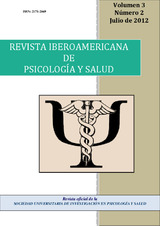Mostrar el registro sencillo del ítem
Rendimiento académico y autoconcepto en estudiantes de Educación Secundaria Obligatoria según el género
| dc.contributor.author | Costa Ponte, Sandra | |
| dc.contributor.author | Tabernero Urbieta, Carmen | |
| dc.date.accessioned | 2013-02-27T11:09:16Z | |
| dc.date.available | 2013-02-27T11:09:16Z | |
| dc.date.issued | 2012 | |
| dc.identifier.uri | http://hdl.handle.net/10396/9281 | |
| dc.description.abstract | Based on social cognitive theory, the purpose of this research is to identify the gender differences in academic performance and selfconcept in a sample of Spanish students of secondary. Also, the role of self-concept as predictor of academic performance is analyzed. For this, 406 students (190 female and 215 male) participated in this research and the questionnaire used to measure self-concept was the AF5. Our results show gender differences in favour of girls in the subject: Spanish Language and Literature and also marginal differences in favour of girls in other subject: Foreign Language. Furthermore, students have got a positive self-concept, not only in general but also in the academic, social, emotional, family and physical aspects. Finally, a path analyses showed that academic, familiar and physical self-concept, and the age of students had a great influence on the academic performance. This search also showed the great importance of family and physical self-concept to determinate the academic self-concept. | es_ES |
| dc.description.abstract | Basado en la teoría social cognitiva, el objetivo de este trabajo consiste en identificar si existen diferencias de género en el rendimiento académico y en el autoconcepto de una muestra de estudiantes de Educación Secundaria Obligatoria de España. Asimismo, se analiza si el autoconcepto actúa como predictor del rendimiento académico. Para ello, participaron en el estudio 406 estudiantes (190 alumnas y 215 alumnos) y el cuestionario utilizado para medir el autoconepto fue el AF5. Los resultados muestran que existen diferencias de género a favor de las chicas en las asignaturas: Lengua Española y Literatura. Se encontró también una diferencia marginal en favor de las chicas en la asignatura Idioma extranjero. Además, los estudiantes poseen un autoconcepto positivo no sólo en general sino también en las facetas académica, social, emocional, familiar y física. No se aprecian diferencias de género en las anteriores dimensiones. Para terminar, mediante una path análisis se demostró que tanto el autoconcepto -académico, familiar y físicocomo la edad del estudiante influyen directamente en el rendimiento académico. El estudio también mostró la importancia del autoconcepto familiar y físico para determinar el autoconcepto académico. | es_ES |
| dc.format.mimetype | application/pdf | es_ES |
| dc.language.iso | spa | es_ES |
| dc.publisher | Universidad de Santiago de Compostela | es_ES |
| dc.rights | https://creativecommons.org/licenses/by-nc-nd/4.0/ | es_ES |
| dc.source | Revista Iberoamericana de Psicología y Salud 3 (2), 175-193 (2012) | es_ES |
| dc.subject | Rendimiento académico | es_ES |
| dc.subject | Autoconcepto | es_ES |
| dc.subject | Diferencias de género | es_ES |
| dc.subject | Educación Secundaria Obligatoria | es_ES |
| dc.subject | Academic performance | es_ES |
| dc.subject | Self concept | es_ES |
| dc.subject | Gender differences | es_ES |
| dc.subject | Secondary school | es_ES |
| dc.title | Rendimiento académico y autoconcepto en estudiantes de Educación Secundaria Obligatoria según el género | es_ES |
| dc.type | info:eu-repo/semantics/article | es_ES |
| dc.rights.accessRights | info:eu-repo/semantics/openAccess | es_ES |

